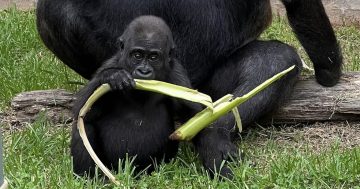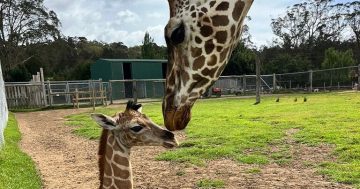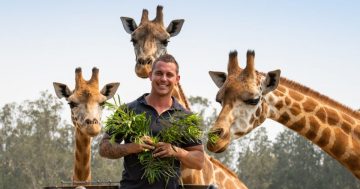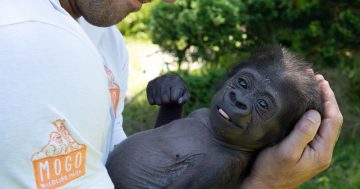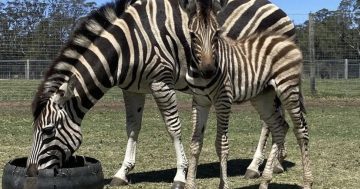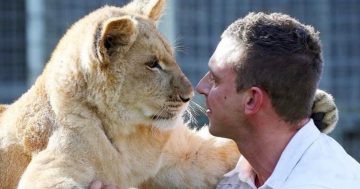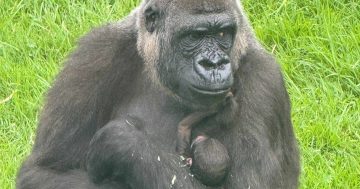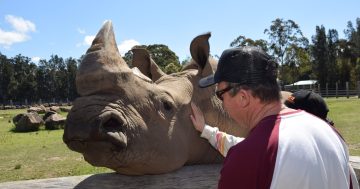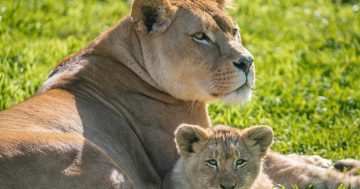
Mogo Wildlife Park director Chad Staples with three of the South Coast zoo’s friendly resident giraffes. Photo: Supplied, Mogo Wildlife Park.
After facing the prospect of not having enough money to cover the costs of feeding its animals, Mogo Wildlife Park is building a new wildlife hospital with funds donated by investors and supporters.
Following the past summer’s bushfires that surrounded the iconic zoo, located south of Batemans Bay, the wildlife sanctuary has been overwhelmed by offers of support and donations from around the world. The zoo’s collection of endangered species and exotic animals came under direct threat during the bushfires and a rescue mission by staff saved all of its 200 animals.
The zoo is in the process of building a wildlife hospital that will help rehabilitate displaced and injured animals, and revive natural habitats following the devastating bushfires.
Atlas Advisors Australia, a funds manager and investment advisory business, raised $30,000 which went towards the Mogo Wildlife Park via the World Wildlife Fund Australia’s Australian Wildlife and Nature Recovery Fund.

Mogo Wildlife Park was at the epicentre of the past summer’s bushfires on the NSW South Coast. Photo: Chad Staples, Mogo Wildlife Park.
The zoo has been closed since 25 March due to the COVID-19 enforced shutdown.
However, while builders get on with construction of the new wildlife hospital, staff at the zoo have been just as busy fielding donations from a GoFundMe fundraiser that has seen more than $151,000 donated by almost 2000 people.
A generator and water pump were sent from Sydney and Canberra along with fuel from Caltex, animal food from Coles and support from Kennards Hire, MTA and Secure Bits, plus help from volunteers who pitched in along the way.
Director of Mogo Wildlife Park Chad Staples, also known as Zookeeper Chad, said funds from investors and the public have gone towards construction of the onsite wildlife rescue hospital that will play a vital role in helping to rehabilitate native wildlife in the area, particular animals affected by the fires.
“We fought very hard to save, and protect, native animals including koalas, kangaroos, echidnas and wallabies throughout the bushfires, but sadly millions of other animals perished,” said Mr Staples. “Our newly equipped hospital means we will be able to help our community by providing a new hub for protecting wildlife.”
Mr Staples said existing foundations were able to be repurposed to build the hospital. The wildlife park is still seeking some diagnostic and medical equipment.
“Smaller veterinary surgeries around the state are critical, but they do not have the resources to assist in large-scale disasters,” said Mr Staples.
“We hope this new facility will be the best in Australia, enabling governments, and environmental and animal services to turn to us at any time to help sick, injured or orphaned animals.”
Executive chairman of Atlas Advisors Australia, Guy Hedley, said donated funds were also put towards the reforestation of fire-damaged areas and damaged wildlife habitats.
“Mogo Wildlife Park is one of many regional organisations playing a vital role in rehabilitating our native fauna and preserving our unique biodiversity,” said Mr Hedley.
“We hope to put more funds towards vital causes, including helping regional businesses that focus on environmental protection.”
Mr Hedley said many investors who had donated funds were waiting lengthy periods for outcomes from their investment programs, which have been stalled because of travel restrictions imposed during the COVID-19 pandemic.
“Reopening these applications could unlock around $100 million in funds to help ailing entrepreneurs, including those in regional areas,” said Mr Hedley.
“Boosting funding allocations towards venture capital under the complying investment framework and creating a new category for regional investment could channel much-needed funds towards innovative environmental startups in regional areas.”






